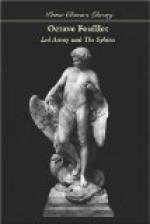The poor fellow, they said, never did any harm but to himself; which, in point of fact, was not the exact truth. Trecoeur had married, at the age of twenty-five, his cousin, Clotilde Andree de Pers, a modest and graceful person who had of the world nothing but its elegance. Madame de Trecoeur had lived with her husband in an atmosphere of unhealthy storms, where she felt out of place, and, as it were, degraded. He tormented her with his remorse almost as much as he did with his faults. He looked upon her, and justly, as an angel, and wept at her feet when he had betrayed her, lamenting that he was unworthy of her; that he was the victim of his temperament, and that he had been born in a faithless age. He threatened once to kill himself in his wife’s boudoir if she did not forgive him; she forgave him, of course. All this dramatic action disturbed Clotilde in her resigned existence. She would have preferred that her misery should have been more quiet and less declamatory.
All the friends of her husband had been in love with her, and had built great hopes upon her forlorn condition, but unfaithful husbands do not always make guilty wives. The reverse is rather more frequently the case, so little is this poor world submitted to the rules of logic. In short, Madame de Trecoeur, after her husband’s death was left forlorn, exhausted, and broken down, but spotless.
From this melancholy union, a daughter had been born, named Julia, and whom her father, notwithstanding all Clotilde’s efforts of resistance, had spoilt to excess. Monsieur de Trecoeur’s idolatry for his daughter was well-known, and the world, with its habitual weakness of judgment, forgave him readily his scandalous existence in consideration of that merit, which is not always a great one. It is not, indeed, a very difficult matter to love one’s children; it is sufficient for that not to be a monster. The love that one has for them is not in itself a virtue; it is a passion which, like all others, may be good or bad, as one is its master or its slave. It may even be thought that there is no passion which may be more than this one, pregnant with good or with evil.
Julia seemed splendidly gifted; but her ardent and precocious disposition had been developed, thanks to the paternal education, as in the primeval forest, wholly at random. She was small in person, dark and pale, lithe and slender, with large blue eyes full of fire, unruly black hair, and superbly arched eyebrows. Her habitual air was reserved and haughty; nevertheless she laid aside, at home, these majestic appearances to frolic on the carpet. She played games of her own invention. She translated her history lessons into little dramas interspersed with speeches to the people, dialogues, music, and particularly chariot-races. In spite of her serious countenance, she could be very funny at times, and made cruel fun of those she did not like.
She manifested for her father a passionate predilection, singularly mitigated by the sentiments of tender pity which her mother’s unhappiness inspired in her youthful heart. She saw her weep often; she would then throw herself upon the floor, curled up at her feet, and there remain for hours, motionless and dumb, looking at her with moist eyes, and drinking from time to time a tear from her cheek.




